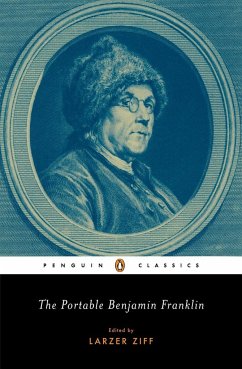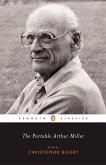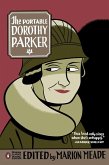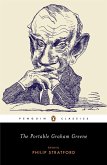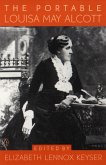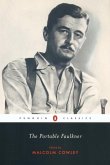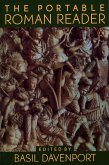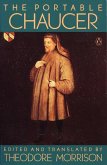Benjamin Franklin
The Portable Benjamin Franklin
23,99 €
inkl. MwSt.
Versandfertig in 1-2 Wochen

12 °P sammeln
Benjamin Franklin
The Portable Benjamin Franklin
- Broschiertes Buch
- Merkliste
- Auf die Merkliste
- Bewerten Bewerten
- Teilen
- Produkt teilen
- Produkterinnerung
- Produkterinnerung
It takes a very inclusive anthology to encompass the protean personality and range of interests of Benjamin Franklin, but The Portable Benjamin Franklin succeeds as no collection has. In addition to the complete Autobiography, the volume contains about 100 of Franklin's major writings-essays, journalism, letters, political tracts, scientific observations, proposals for the improvement of civic and personal life, literary bagatelles, and private musings. The selections are reprinted in their entirety and organized chronologically within six sections that represent the full range of Franklin's…mehr
Andere Kunden interessierten sich auch für
![The Portable Arthur Miller The Portable Arthur Miller]() Arthur MillerThe Portable Arthur Miller26,99 €
Arthur MillerThe Portable Arthur Miller26,99 €![The Portable Dorothy Parker The Portable Dorothy Parker]() Dorothy ParkerThe Portable Dorothy Parker18,99 €
Dorothy ParkerThe Portable Dorothy Parker18,99 €![The Portable Graham Greene The Portable Graham Greene]() Graham GreeneThe Portable Graham Greene24,99 €
Graham GreeneThe Portable Graham Greene24,99 €![The Portable Louisa May Alcott The Portable Louisa May Alcott]() Louisa May AlcottThe Portable Louisa May Alcott24,99 €
Louisa May AlcottThe Portable Louisa May Alcott24,99 €![The Portable Faulkner The Portable Faulkner]() William FaulknerThe Portable Faulkner23,99 €
William FaulknerThe Portable Faulkner23,99 €![The Portable Roman Reader The Portable Roman Reader]() VariousThe Portable Roman Reader24,99 €
VariousThe Portable Roman Reader24,99 €![The Portable Chaucer The Portable Chaucer]() Geoffrey ChaucerThe Portable Chaucer21,99 €
Geoffrey ChaucerThe Portable Chaucer21,99 €-
-
-
It takes a very inclusive anthology to encompass the protean personality and range of interests of Benjamin Franklin, but The Portable Benjamin Franklin succeeds as no collection has. In addition to the complete Autobiography, the volume contains about 100 of Franklin's major writings-essays, journalism, letters, political tracts, scientific observations, proposals for the improvement of civic and personal life, literary bagatelles, and private musings. The selections are reprinted in their entirety and organized chronologically within six sections that represent the full range of Franklin's temperament. The result is a zestful read for Franklin scholars and anyone wanting to know and enjoy this American icon. For more than seventy years, Penguin has been the leading publisher of classic literature in the English-speaking world. With more than 1,700 titles, Penguin Classics represents a global bookshelf of the best works throughout history and across genres and disciplines. Readers trust the series to provide authoritative texts enhanced by introductions and notes by distinguished scholars and contemporary authors, as well as up-to-date translations by award-winning translators.
Hinweis: Dieser Artikel kann nur an eine deutsche Lieferadresse ausgeliefert werden.
Hinweis: Dieser Artikel kann nur an eine deutsche Lieferadresse ausgeliefert werden.
Produktdetails
- Produktdetails
- Verlag: Penguin Publishing Group
- Seitenzahl: 594
- Erscheinungstermin: 3. Januar 2006
- Englisch
- Abmessung: 197mm x 129mm x 32mm
- Gewicht: 619g
- ISBN-13: 9780143039549
- ISBN-10: 0143039547
- Artikelnr.: 22216909
- Herstellerkennzeichnung
- Libri GmbH
- Europaallee 1
- 36244 Bad Hersfeld
- gpsr@libri.de
- Verlag: Penguin Publishing Group
- Seitenzahl: 594
- Erscheinungstermin: 3. Januar 2006
- Englisch
- Abmessung: 197mm x 129mm x 32mm
- Gewicht: 619g
- ISBN-13: 9780143039549
- ISBN-10: 0143039547
- Artikelnr.: 22216909
- Herstellerkennzeichnung
- Libri GmbH
- Europaallee 1
- 36244 Bad Hersfeld
- gpsr@libri.de
Benjamin Franklin (1706-1790) was a prominent American polymath and a founding father of the United States, renowned for his diverse contributions as a writer, scientist, inventor, statesman, and diplomat.
The Portable Benjamin FranklinIntroduction
Acknowledgments
Note on the Texts
The Portable Benjamin Franklin
Autobiography
Selected Writings
I. Printer, Journalist, Tradesman (1722-1757)
1722: The Dogood Papers (Nos. I, II, IV, VII)
1728: Epitaph
The Pennsylvania Gazette
1729: The Printer to the Reader
1731: An Apology for Printers
1732: Letter from Anthony Afterwit
1732: Letter from Celia Single
1735: Advice to a Pretty Creature and Replies
Poor Richard, & Poor Richard Improved
1736: Hints for Those That Would Be Rich
1739: A True Prognostication
1753: Title Page
1753: Preface
1757: Directions for Making a Striking Sun Dial
1758: The Way to Wealth
II. The Betterment of Life
Civic and Personal Improvement
1743: Promoting Useful Knowledge
1749: Education of Youth
1760: To Mary Stevenson (reading with pen in hand)
1760: To Mary Stevenson (acquaintance with nature)
1763: To Mary Stevenson (American young begin to lisp)
1760s(?): To Oliver Neave (swimming lesson)
1782: The Handsome and Deformed Leg
1785: To Richard Price (books instead of a bell)
1786: The Art of Procuring Pleasant Dreams
Plans Private and Domestic
1748: To Cadwallader Colden (intends to retire)
1750: To Abiah Franklin (life in retirement)
1756: To Deborah Franklin (camp life)
1758: To Deborah Franklin (household arrangements)
1762: To William Strahan (intends to move to England)
1784: To William Franklin (reconciliation?)
1789: Codicil to Last Will and Testament
Inventions, Experiments, Observations
1747: To Peter Collinson (on electricity)
1750: To a Friend in Boston (an electric shock)
1752: To Peter Collinson (electrical kite)
1755: To Peter Collinson (whirlwinds)
1757: To John Pringle (electricity in paralytic cases)
1762: To Sir Alexander Dick (Pennsylvania fireplace [Franklin stove])
1762: To David Hume (installing a lightning rod)
1780: To Joseph Priestley (power of man over matter)
1783: To Sir Joseph Banks (some suppose flying now to be invented)
1784: To La Sabliere de la Condamine (cures by electricity and animal
magnetism)
1785: To George Whatley (ruminations approaching age eighty)
1786: An Instrument for Taking Down Books from High Shelves
1786: To Benjamin Vaughan (lead poisoning)
III. Politics: Theory and Practice
Philadelphia, 1734-1757
1751: On Transported Felons
1751: Exporting of Felons to the Colonies
1751: Increase of Mankind
1754: Join or Die
1754: Three Letters to Governor Shirley
London and Philadelphia, 1757-1764
1763: To Isaac Norris (submits receipts)
1764: To Peter Collinson (let trade take its course)
London: Colonial Agent, 1764-1775
1766: Price of Corn, and Management of the Poor
1773: Rules by Which a Great Empire May Be Reduced to a Small One
1773: An Edict by the King of Prussia
1773: To William Franklin (on preceding satires)
Philadelphia: Revolution, 1775-1776
1775: To William Strahan (you are now my enemy)
1775: To Joseph Priestley (the Americans will fight)
1775: To a Friend in England [David Hartley] (there is no little enemy)
1776: To Lord Howe (impossible we should think of submission)
1776: Anecdote recalled by Jefferson about editing of Declaration of
Independence
Paris: American Minister, 1776-1785
1777: To Mary Hewson (figure to yourself an old man)
1777: The Sale of the Hessians
1777(?): To a Friend (you have no idea of how I am harassed)
1777: Model of a Letter of Recommendation
1778: To Charles de Weissenstein (Parliament never had a right to govern
us)
1779: Passport for Captain Cook
1779: The Levee
1780: To George Washington (you may live to see our country flourish)
1782: To James Hutton (murder of the Moravian Indians)
1782: Apologue
1782: To Sir Joseph Banks (long for a return of peaceful times)
1782: Information to Those Who Would Remove to America
1783: To Sir Joseph Banks (there never was a good war or a bad peace)
1784: To Sarah Bache (honor is a personal thing)
United States of America: Philadelphia, 1785-1790
1787: Constitutional Convention, Speech on Subject of Salaries
1787: Constitutional Convention, Speech at the Conclusion of Deliberations
1788: On the Abuse of the Press
1789: An Address to the Public on Slavery
1789: Plan for Improving the Condition of the Free Blacks
1790: Sidi Mehemet Ibrahim on the Slave Trade
IV. Religion: Belief and Critique
1725: A Dissertation on Liberty and Necessity, Pleasure and Pain
1738: To Josiah Franklin (religious opinions)
1753: To Joseph Huey (on good works)
1762: To Jared Ingersoll (deity not so angry as a New England justice)
1779: Conte
1780: To Richard Price (religious tests)
1784: To Samuel Mather (memory of Cotton Mather)
1790: To Ezra Stiles (something of my religion)
V. Bagatelles and Dalliances
1730: A Witch Trial at Mount Holly
1745: Advice to a Young Man
1747: The Speech of Polly Baker
1765: To the Editor of a Newspaper (the world is grown too incredulous)
1777: The Twelve Commandments (to Madame Brillon)
1778: The Ephemera (To Madame Brillon)
1778: Elysian Fields (To Madame Helvetius)
1779: The Whistle (To Madame Brillon)
1779: Morals of Chess
1779: To Elizabeth Partridge (somebody gave it out that I loved ladies)
1780: Dialogue Between Franklin and the Gout
1784: An Economical Project
1785: A Petition of the Left Hand
VI. Virtuoso
1755: To Peter Collinson (contents of a busy mind)
1760: To David Hume (unusual words)
1762: To Giambatista Beccaria (the armonica)
1781: To Court de Gebelin (Indian languages)
1789: To Noah Webster (purity of English)
Chronology
Glossary of Correspondents
Editor's Notes
Acknowledgments
Note on the Texts
The Portable Benjamin Franklin
Autobiography
Selected Writings
I. Printer, Journalist, Tradesman (1722-1757)
1722: The Dogood Papers (Nos. I, II, IV, VII)
1728: Epitaph
The Pennsylvania Gazette
1729: The Printer to the Reader
1731: An Apology for Printers
1732: Letter from Anthony Afterwit
1732: Letter from Celia Single
1735: Advice to a Pretty Creature and Replies
Poor Richard, & Poor Richard Improved
1736: Hints for Those That Would Be Rich
1739: A True Prognostication
1753: Title Page
1753: Preface
1757: Directions for Making a Striking Sun Dial
1758: The Way to Wealth
II. The Betterment of Life
Civic and Personal Improvement
1743: Promoting Useful Knowledge
1749: Education of Youth
1760: To Mary Stevenson (reading with pen in hand)
1760: To Mary Stevenson (acquaintance with nature)
1763: To Mary Stevenson (American young begin to lisp)
1760s(?): To Oliver Neave (swimming lesson)
1782: The Handsome and Deformed Leg
1785: To Richard Price (books instead of a bell)
1786: The Art of Procuring Pleasant Dreams
Plans Private and Domestic
1748: To Cadwallader Colden (intends to retire)
1750: To Abiah Franklin (life in retirement)
1756: To Deborah Franklin (camp life)
1758: To Deborah Franklin (household arrangements)
1762: To William Strahan (intends to move to England)
1784: To William Franklin (reconciliation?)
1789: Codicil to Last Will and Testament
Inventions, Experiments, Observations
1747: To Peter Collinson (on electricity)
1750: To a Friend in Boston (an electric shock)
1752: To Peter Collinson (electrical kite)
1755: To Peter Collinson (whirlwinds)
1757: To John Pringle (electricity in paralytic cases)
1762: To Sir Alexander Dick (Pennsylvania fireplace [Franklin stove])
1762: To David Hume (installing a lightning rod)
1780: To Joseph Priestley (power of man over matter)
1783: To Sir Joseph Banks (some suppose flying now to be invented)
1784: To La Sabliere de la Condamine (cures by electricity and animal
magnetism)
1785: To George Whatley (ruminations approaching age eighty)
1786: An Instrument for Taking Down Books from High Shelves
1786: To Benjamin Vaughan (lead poisoning)
III. Politics: Theory and Practice
Philadelphia, 1734-1757
1751: On Transported Felons
1751: Exporting of Felons to the Colonies
1751: Increase of Mankind
1754: Join or Die
1754: Three Letters to Governor Shirley
London and Philadelphia, 1757-1764
1763: To Isaac Norris (submits receipts)
1764: To Peter Collinson (let trade take its course)
London: Colonial Agent, 1764-1775
1766: Price of Corn, and Management of the Poor
1773: Rules by Which a Great Empire May Be Reduced to a Small One
1773: An Edict by the King of Prussia
1773: To William Franklin (on preceding satires)
Philadelphia: Revolution, 1775-1776
1775: To William Strahan (you are now my enemy)
1775: To Joseph Priestley (the Americans will fight)
1775: To a Friend in England [David Hartley] (there is no little enemy)
1776: To Lord Howe (impossible we should think of submission)
1776: Anecdote recalled by Jefferson about editing of Declaration of
Independence
Paris: American Minister, 1776-1785
1777: To Mary Hewson (figure to yourself an old man)
1777: The Sale of the Hessians
1777(?): To a Friend (you have no idea of how I am harassed)
1777: Model of a Letter of Recommendation
1778: To Charles de Weissenstein (Parliament never had a right to govern
us)
1779: Passport for Captain Cook
1779: The Levee
1780: To George Washington (you may live to see our country flourish)
1782: To James Hutton (murder of the Moravian Indians)
1782: Apologue
1782: To Sir Joseph Banks (long for a return of peaceful times)
1782: Information to Those Who Would Remove to America
1783: To Sir Joseph Banks (there never was a good war or a bad peace)
1784: To Sarah Bache (honor is a personal thing)
United States of America: Philadelphia, 1785-1790
1787: Constitutional Convention, Speech on Subject of Salaries
1787: Constitutional Convention, Speech at the Conclusion of Deliberations
1788: On the Abuse of the Press
1789: An Address to the Public on Slavery
1789: Plan for Improving the Condition of the Free Blacks
1790: Sidi Mehemet Ibrahim on the Slave Trade
IV. Religion: Belief and Critique
1725: A Dissertation on Liberty and Necessity, Pleasure and Pain
1738: To Josiah Franklin (religious opinions)
1753: To Joseph Huey (on good works)
1762: To Jared Ingersoll (deity not so angry as a New England justice)
1779: Conte
1780: To Richard Price (religious tests)
1784: To Samuel Mather (memory of Cotton Mather)
1790: To Ezra Stiles (something of my religion)
V. Bagatelles and Dalliances
1730: A Witch Trial at Mount Holly
1745: Advice to a Young Man
1747: The Speech of Polly Baker
1765: To the Editor of a Newspaper (the world is grown too incredulous)
1777: The Twelve Commandments (to Madame Brillon)
1778: The Ephemera (To Madame Brillon)
1778: Elysian Fields (To Madame Helvetius)
1779: The Whistle (To Madame Brillon)
1779: Morals of Chess
1779: To Elizabeth Partridge (somebody gave it out that I loved ladies)
1780: Dialogue Between Franklin and the Gout
1784: An Economical Project
1785: A Petition of the Left Hand
VI. Virtuoso
1755: To Peter Collinson (contents of a busy mind)
1760: To David Hume (unusual words)
1762: To Giambatista Beccaria (the armonica)
1781: To Court de Gebelin (Indian languages)
1789: To Noah Webster (purity of English)
Chronology
Glossary of Correspondents
Editor's Notes
The Portable Benjamin FranklinIntroduction
Acknowledgments
Note on the Texts
The Portable Benjamin Franklin
Autobiography
Selected Writings
I. Printer, Journalist, Tradesman (1722-1757)
1722: The Dogood Papers (Nos. I, II, IV, VII)
1728: Epitaph
The Pennsylvania Gazette
1729: The Printer to the Reader
1731: An Apology for Printers
1732: Letter from Anthony Afterwit
1732: Letter from Celia Single
1735: Advice to a Pretty Creature and Replies
Poor Richard, & Poor Richard Improved
1736: Hints for Those That Would Be Rich
1739: A True Prognostication
1753: Title Page
1753: Preface
1757: Directions for Making a Striking Sun Dial
1758: The Way to Wealth
II. The Betterment of Life
Civic and Personal Improvement
1743: Promoting Useful Knowledge
1749: Education of Youth
1760: To Mary Stevenson (reading with pen in hand)
1760: To Mary Stevenson (acquaintance with nature)
1763: To Mary Stevenson (American young begin to lisp)
1760s(?): To Oliver Neave (swimming lesson)
1782: The Handsome and Deformed Leg
1785: To Richard Price (books instead of a bell)
1786: The Art of Procuring Pleasant Dreams
Plans Private and Domestic
1748: To Cadwallader Colden (intends to retire)
1750: To Abiah Franklin (life in retirement)
1756: To Deborah Franklin (camp life)
1758: To Deborah Franklin (household arrangements)
1762: To William Strahan (intends to move to England)
1784: To William Franklin (reconciliation?)
1789: Codicil to Last Will and Testament
Inventions, Experiments, Observations
1747: To Peter Collinson (on electricity)
1750: To a Friend in Boston (an electric shock)
1752: To Peter Collinson (electrical kite)
1755: To Peter Collinson (whirlwinds)
1757: To John Pringle (electricity in paralytic cases)
1762: To Sir Alexander Dick (Pennsylvania fireplace [Franklin stove])
1762: To David Hume (installing a lightning rod)
1780: To Joseph Priestley (power of man over matter)
1783: To Sir Joseph Banks (some suppose flying now to be invented)
1784: To La Sabliere de la Condamine (cures by electricity and animal
magnetism)
1785: To George Whatley (ruminations approaching age eighty)
1786: An Instrument for Taking Down Books from High Shelves
1786: To Benjamin Vaughan (lead poisoning)
III. Politics: Theory and Practice
Philadelphia, 1734-1757
1751: On Transported Felons
1751: Exporting of Felons to the Colonies
1751: Increase of Mankind
1754: Join or Die
1754: Three Letters to Governor Shirley
London and Philadelphia, 1757-1764
1763: To Isaac Norris (submits receipts)
1764: To Peter Collinson (let trade take its course)
London: Colonial Agent, 1764-1775
1766: Price of Corn, and Management of the Poor
1773: Rules by Which a Great Empire May Be Reduced to a Small One
1773: An Edict by the King of Prussia
1773: To William Franklin (on preceding satires)
Philadelphia: Revolution, 1775-1776
1775: To William Strahan (you are now my enemy)
1775: To Joseph Priestley (the Americans will fight)
1775: To a Friend in England [David Hartley] (there is no little enemy)
1776: To Lord Howe (impossible we should think of submission)
1776: Anecdote recalled by Jefferson about editing of Declaration of
Independence
Paris: American Minister, 1776-1785
1777: To Mary Hewson (figure to yourself an old man)
1777: The Sale of the Hessians
1777(?): To a Friend (you have no idea of how I am harassed)
1777: Model of a Letter of Recommendation
1778: To Charles de Weissenstein (Parliament never had a right to govern
us)
1779: Passport for Captain Cook
1779: The Levee
1780: To George Washington (you may live to see our country flourish)
1782: To James Hutton (murder of the Moravian Indians)
1782: Apologue
1782: To Sir Joseph Banks (long for a return of peaceful times)
1782: Information to Those Who Would Remove to America
1783: To Sir Joseph Banks (there never was a good war or a bad peace)
1784: To Sarah Bache (honor is a personal thing)
United States of America: Philadelphia, 1785-1790
1787: Constitutional Convention, Speech on Subject of Salaries
1787: Constitutional Convention, Speech at the Conclusion of Deliberations
1788: On the Abuse of the Press
1789: An Address to the Public on Slavery
1789: Plan for Improving the Condition of the Free Blacks
1790: Sidi Mehemet Ibrahim on the Slave Trade
IV. Religion: Belief and Critique
1725: A Dissertation on Liberty and Necessity, Pleasure and Pain
1738: To Josiah Franklin (religious opinions)
1753: To Joseph Huey (on good works)
1762: To Jared Ingersoll (deity not so angry as a New England justice)
1779: Conte
1780: To Richard Price (religious tests)
1784: To Samuel Mather (memory of Cotton Mather)
1790: To Ezra Stiles (something of my religion)
V. Bagatelles and Dalliances
1730: A Witch Trial at Mount Holly
1745: Advice to a Young Man
1747: The Speech of Polly Baker
1765: To the Editor of a Newspaper (the world is grown too incredulous)
1777: The Twelve Commandments (to Madame Brillon)
1778: The Ephemera (To Madame Brillon)
1778: Elysian Fields (To Madame Helvetius)
1779: The Whistle (To Madame Brillon)
1779: Morals of Chess
1779: To Elizabeth Partridge (somebody gave it out that I loved ladies)
1780: Dialogue Between Franklin and the Gout
1784: An Economical Project
1785: A Petition of the Left Hand
VI. Virtuoso
1755: To Peter Collinson (contents of a busy mind)
1760: To David Hume (unusual words)
1762: To Giambatista Beccaria (the armonica)
1781: To Court de Gebelin (Indian languages)
1789: To Noah Webster (purity of English)
Chronology
Glossary of Correspondents
Editor's Notes
Acknowledgments
Note on the Texts
The Portable Benjamin Franklin
Autobiography
Selected Writings
I. Printer, Journalist, Tradesman (1722-1757)
1722: The Dogood Papers (Nos. I, II, IV, VII)
1728: Epitaph
The Pennsylvania Gazette
1729: The Printer to the Reader
1731: An Apology for Printers
1732: Letter from Anthony Afterwit
1732: Letter from Celia Single
1735: Advice to a Pretty Creature and Replies
Poor Richard, & Poor Richard Improved
1736: Hints for Those That Would Be Rich
1739: A True Prognostication
1753: Title Page
1753: Preface
1757: Directions for Making a Striking Sun Dial
1758: The Way to Wealth
II. The Betterment of Life
Civic and Personal Improvement
1743: Promoting Useful Knowledge
1749: Education of Youth
1760: To Mary Stevenson (reading with pen in hand)
1760: To Mary Stevenson (acquaintance with nature)
1763: To Mary Stevenson (American young begin to lisp)
1760s(?): To Oliver Neave (swimming lesson)
1782: The Handsome and Deformed Leg
1785: To Richard Price (books instead of a bell)
1786: The Art of Procuring Pleasant Dreams
Plans Private and Domestic
1748: To Cadwallader Colden (intends to retire)
1750: To Abiah Franklin (life in retirement)
1756: To Deborah Franklin (camp life)
1758: To Deborah Franklin (household arrangements)
1762: To William Strahan (intends to move to England)
1784: To William Franklin (reconciliation?)
1789: Codicil to Last Will and Testament
Inventions, Experiments, Observations
1747: To Peter Collinson (on electricity)
1750: To a Friend in Boston (an electric shock)
1752: To Peter Collinson (electrical kite)
1755: To Peter Collinson (whirlwinds)
1757: To John Pringle (electricity in paralytic cases)
1762: To Sir Alexander Dick (Pennsylvania fireplace [Franklin stove])
1762: To David Hume (installing a lightning rod)
1780: To Joseph Priestley (power of man over matter)
1783: To Sir Joseph Banks (some suppose flying now to be invented)
1784: To La Sabliere de la Condamine (cures by electricity and animal
magnetism)
1785: To George Whatley (ruminations approaching age eighty)
1786: An Instrument for Taking Down Books from High Shelves
1786: To Benjamin Vaughan (lead poisoning)
III. Politics: Theory and Practice
Philadelphia, 1734-1757
1751: On Transported Felons
1751: Exporting of Felons to the Colonies
1751: Increase of Mankind
1754: Join or Die
1754: Three Letters to Governor Shirley
London and Philadelphia, 1757-1764
1763: To Isaac Norris (submits receipts)
1764: To Peter Collinson (let trade take its course)
London: Colonial Agent, 1764-1775
1766: Price of Corn, and Management of the Poor
1773: Rules by Which a Great Empire May Be Reduced to a Small One
1773: An Edict by the King of Prussia
1773: To William Franklin (on preceding satires)
Philadelphia: Revolution, 1775-1776
1775: To William Strahan (you are now my enemy)
1775: To Joseph Priestley (the Americans will fight)
1775: To a Friend in England [David Hartley] (there is no little enemy)
1776: To Lord Howe (impossible we should think of submission)
1776: Anecdote recalled by Jefferson about editing of Declaration of
Independence
Paris: American Minister, 1776-1785
1777: To Mary Hewson (figure to yourself an old man)
1777: The Sale of the Hessians
1777(?): To a Friend (you have no idea of how I am harassed)
1777: Model of a Letter of Recommendation
1778: To Charles de Weissenstein (Parliament never had a right to govern
us)
1779: Passport for Captain Cook
1779: The Levee
1780: To George Washington (you may live to see our country flourish)
1782: To James Hutton (murder of the Moravian Indians)
1782: Apologue
1782: To Sir Joseph Banks (long for a return of peaceful times)
1782: Information to Those Who Would Remove to America
1783: To Sir Joseph Banks (there never was a good war or a bad peace)
1784: To Sarah Bache (honor is a personal thing)
United States of America: Philadelphia, 1785-1790
1787: Constitutional Convention, Speech on Subject of Salaries
1787: Constitutional Convention, Speech at the Conclusion of Deliberations
1788: On the Abuse of the Press
1789: An Address to the Public on Slavery
1789: Plan for Improving the Condition of the Free Blacks
1790: Sidi Mehemet Ibrahim on the Slave Trade
IV. Religion: Belief and Critique
1725: A Dissertation on Liberty and Necessity, Pleasure and Pain
1738: To Josiah Franklin (religious opinions)
1753: To Joseph Huey (on good works)
1762: To Jared Ingersoll (deity not so angry as a New England justice)
1779: Conte
1780: To Richard Price (religious tests)
1784: To Samuel Mather (memory of Cotton Mather)
1790: To Ezra Stiles (something of my religion)
V. Bagatelles and Dalliances
1730: A Witch Trial at Mount Holly
1745: Advice to a Young Man
1747: The Speech of Polly Baker
1765: To the Editor of a Newspaper (the world is grown too incredulous)
1777: The Twelve Commandments (to Madame Brillon)
1778: The Ephemera (To Madame Brillon)
1778: Elysian Fields (To Madame Helvetius)
1779: The Whistle (To Madame Brillon)
1779: Morals of Chess
1779: To Elizabeth Partridge (somebody gave it out that I loved ladies)
1780: Dialogue Between Franklin and the Gout
1784: An Economical Project
1785: A Petition of the Left Hand
VI. Virtuoso
1755: To Peter Collinson (contents of a busy mind)
1760: To David Hume (unusual words)
1762: To Giambatista Beccaria (the armonica)
1781: To Court de Gebelin (Indian languages)
1789: To Noah Webster (purity of English)
Chronology
Glossary of Correspondents
Editor's Notes
